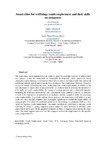Mostrar o rexistro simple do ítem
Smart cities for wellbeing: youth employment and their skills on computers
| dc.contributor.author | Picatoste, Xosé | |
| dc.contributor.author | Pérez Ortiz, Laura | |
| dc.contributor.author | Ruesga Benito, Santos Miguel | |
| dc.contributor.author | Novo-Cortí, Isabel | |
| dc.date.accessioned | 2024-01-11T10:01:56Z | |
| dc.date.available | 2024-01-11T10:01:56Z | |
| dc.date.issued | 2018 | |
| dc.identifier.citation | Picatoste, J., Pérez-Ortiz, L., Ruesga-Benito, S.M. and Novo-Corti, I. (2018), "Smart cities for wellbeing: youth employment and their skills on computers", Journal of Science and Technology Policy Management, Vol. 9 No. 2, pp. 227-241. https://doi-org.accedys.udc.es/10.1108/JSTPM-04-2017-0014 | es_ES |
| dc.identifier.issn | 2053-4620 | |
| dc.identifier.uri | http://hdl.handle.net/2183/34811 | |
| dc.description.abstract | [Abstract]: The smart cities can be understood as an inclusive space for each and everyone to achieve their best options, within the framework of sustainable development, where institutions boost information and technology environments which help to achieve the highest individual and social well-being with the aim of improving the lives of citizens. The youth group (between 15 and 24 years) was sternly affected for the crisis. In this paper the youth employability, in relation to the new challenges of smart cities, is analyzed in the EU, with the aim of assessing the influence of ICTs skills on youth employability. By means of a mean analysis and a Structural Equation Modelling the differences between the Euro Area and the other countries in the EU is analyzed, as well as the importance of information technologies and the computers skills for increasing youth employability. The results indicate that awareness of the importance of IT skills is greater in the euro area and that computer skills and highly significant to explain the employability of young people. The achieved conclusions point out to the training on computers skills as a key factor for boosting youth employment. This paper contribution could help to increase social wellbeing by means of giving support to policy makers to make decisions to increase youth employment and to provide the qualified workforce to those companies arose among the smart cities. The main original value is to link the computer skills to the employment for the specific youth group in the EU. | es_ES |
| dc.language.iso | eng | es_ES |
| dc.relation.uri | https://doi-org.accedys.udc.es/10.1108/JSTPM-04-2017-0014 | es_ES |
| dc.rights | Atribución-NoComercial 4.0 | es_ES |
| dc.rights.uri | http://creativecommons.org/licenses/by-nc/3.0/es/ | * |
| dc.subject | Youth Employment | es_ES |
| dc.subject | Smart Cities | es_ES |
| dc.subject | ICTs | es_ES |
| dc.subject | European Union | es_ES |
| dc.subject | Structural Equation Modelling (SEM) | es_ES |
| dc.title | Smart cities for wellbeing: youth employment and their skills on computers | es_ES |
| dc.type | info:eu-repo/semantics/article | es_ES |
| dc.rights.access | info:eu-repo/semantics/openAccess | es_ES |
| UDC.journalTitle | Journal of Science and Technology Policy Management | es_ES |
| UDC.volume | 9 | es_ES |
| UDC.issue | 2 | es_ES |
| UDC.startPage | 227 | es_ES |
| UDC.endPage | 241 | es_ES |
| dc.identifier.doi | . https://doi-org.accedys.udc.es/10.1108/JSTPM-04-2017-0014 |
Ficheiros no ítem
Este ítem aparece na(s) seguinte(s) colección(s)
-
GI-EDaSS - Artigos [29]






